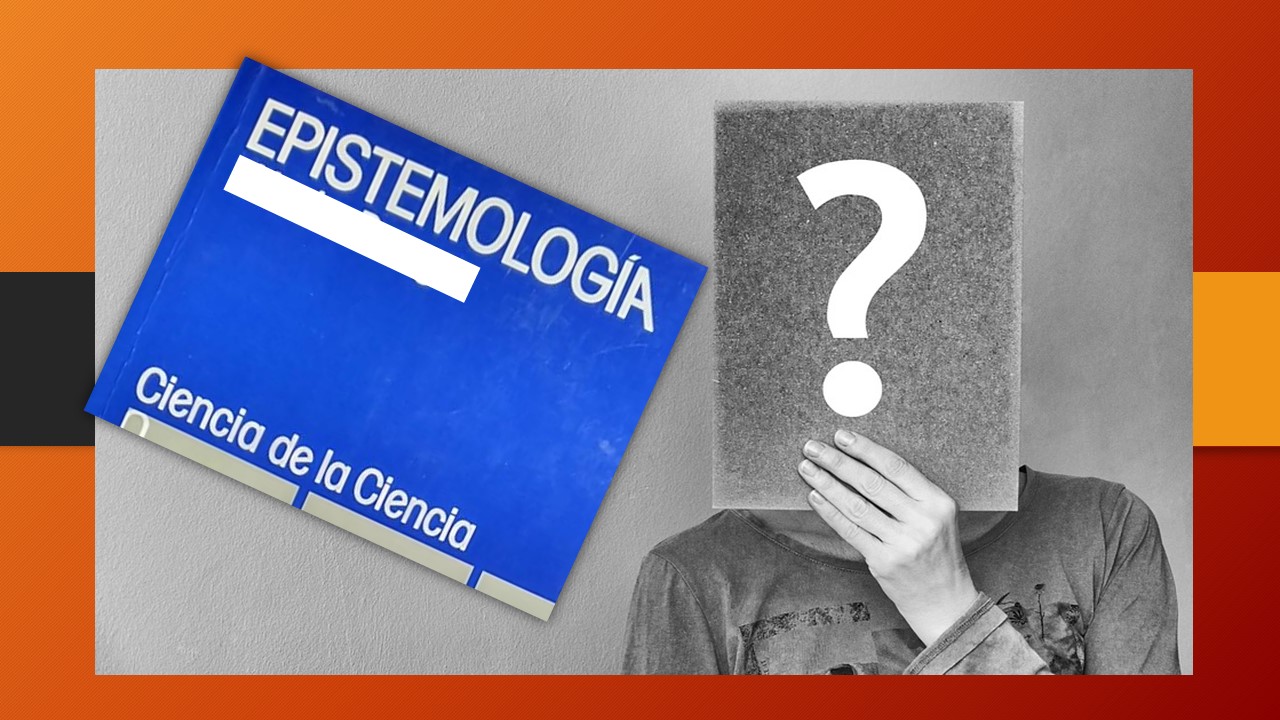¿Acaso puede existir una "ciencia de la ciencia"? / Can there be a "science of science"?
Este artículo académico trata sobre una crítica (más allá de lo lingüístico) de la débil expresión usada por algunos escritores la cual reza "epistemología es una ciencia de la ciencia". Autores serios como Mario Bunge -entre otros- llegaron a usarla sin virtud. Accedan, amigos usuarios de Hive, al post y participemos de la necesaria crítica...
This academic article deals with a critique (beyond the linguistic) of the weak expression used by some writers which reads "epistemology is a science of science". Serious authors like Mario Bunge -among others- came to use it without virtue. Access, friends, Hive users, to the post and let us participate in the necessary criticism ...

Life is full of contradictions. Big and small contradictions; significant and insignificant ... but contradictions in the end. And although not many so-called wise men realize it, this is (in the logical-dialectical conception of contradiction!) The foundation of a system of ideas that apparently goes against the "sacrosanct" logical-analytic law of non-contradiction ( so linearly assumed by not a few of those "wise mathematicians," wise physicists, "wise sociologists", "wise jurists", etc.). It is, thus, the confrontation between this ancient and fertile logical-analytical law of non-contradiction (There cannot be, at the same time and conditions, a thing and its opposite) and the also ancient and fertile dialectical law * of contradiction ( A state that tends to remain the same and another that tends to impose a different state - even radically different - dwells in everything necessarily.
It is appropriate now to add the word "paradox". Paradox, as is known, means that what at a moment x, ye or zeta is being raised registers to some notable degree, something that does not fit in with logic; of course ... both in that logic that monovidently penalizes the contradictory, and in that logic that fails to resolve the inevitably contradictory. It is paradoxical that the dentist who attends us at any given time has and exhibits a tooth with cavities ... That a policeman demands money from us so that we can avoid the traffic violation that we committed every day in the city. It is paradoxical for a husband or wife to be unfaithful in the middle of a "harmonious coexistence" period.
Well. Everything that we have said here so far is part of the concern that we have for a long time in the heat of our academic career of just over half a century, regarding the expression that "epistemology is a science of science" and other sayings like that ...
The first thing we have to say about this expression that "epistemology is a science of science" is that it militates in the crude criterion that "science" is synonymous with "theory." It is truly paradoxical that in the academic environment there are professionals who incur such a thick, despicable vision. A type of theory so punctual and total at the same time (this, because it embodies concrete verification in correspondence with a qualified vision of the total) and so coherent in the investigative and especially in the expository, such as science, cannot be treated according to a signifier as varied and scattered as the word "theory" is. Although science, together with philosophy and the various ideological manifestations (of vulgar thought, immediacy, etc.) is part of the theory, it cannot be treated (at least from the academy, from the epistemological milieu ...) in a way that runs the risk of giving an "anything goes" connotation.

In theory we have three great means; namely, the scientific, the philosophical, and the ideological. The ideological terrain is the relief of the everyday, of the circumstantial, of what is marked by the shameless and situational action of social power. Ideology and social power are greatly associated with the convenience of the conjunctural in the hot frame of social events. It is present from the personal context corresponding to the internal fabric of language, thought and emotionality to matters such as propaganda, the culture that is breathed in the daily life of society. The field of the philosophical is the same, but sweetened well in the personal expression of those who exercise it (the philosophers), or in the corporate expression (academies, publishing houses, States ...). Philosophy is (assuming redundancy) ideologically treated as prestige, supremacy. At the end of the day, both manifestations of the theory (ideology and philosophy) embody speculation, apriorisms, biases ... Even so, it must be said that not everything philosophical and ideological carries with it falsehood, concealment, the illogical . They are a mixed, miscellaneous, contradictory, paradoxical medium. There may be truths there, although they do not register a total-concrete objectivity. (We warn that those contents that conceal reality which make life in the philosophical and ideological media, are called in the academy, in different ways ... ideology, pseudo-concrete, ideological surplus value*).
The critical reflection that the theory in general is made, we call gnoseology. Thus, gnoseology is philosophy both from the restricted and very special context of science, and from the scattered context of the ideological and the philosophical. Gnoseology is philosophy of science (and as such we call it epistemology), philosophy of ideology (and as such we call it axiology ****) and philosophy of philosophy (and as such we call it gnosology). As for the latter, it is good to say that to assume such repetition of terms, we have very especially appealed to the logical-mathematical principle that every set is a subset of itself…. We avoid at all costs using the signifier of "metatheory" for the matter. We are better off assuming that gnoseology encompasses the epistemological (critical theory of science), the axiological (critical theory of ideology), and the philosophical (critical theory of philosophy).
There can be no science of science. There may be a philosophy of science; that is to say, epistemology. Epistemology deals openly and in a plural way, both the problems related to the objectivity of science (research topics, methods, criteria of rigor, etc.) and the problems linked to the rationality of science (logic of the expository discourse of the investigative work). One caveat ... Those issues linked to the moral (ethics and aesthetics) of science do not belong to the field of epistemology, but they do belong to the field of gnoseology (that is, for that matter ... to the philosophical field of the philosophical) .
There can be a philosophy of science (above all, of the aspects linked to objectivity and rationality), that is to say epistemology, but not "science of science". It is not appropriate to speak of "science of science"; not. The concrete existence of a "science of science" would be more or less coupled with what believers see as "heaven" (that is, an eventual kingdom of God) and with what followers of the historical Marxist dream see (or they saw) as "the communist society" (that is, an eventual social environment in which the advice of each person is carried out according to their needs and capacities *****).
We have no reservations in admitting that the epistemologist Mario Bunge (Argentine-Canadian, 1910-2020) was remarkable, productive; many times brilliant, other times not so much. We do not know if the unfortunate phrase that we question here today, and that appears on the bluish cover of one of his good books, was his idea or a prank by the publicists of the publishing house that made the publication ... In any case such mistake is a contradiction, a paradox ...

♦
- NOTAS QUE VIENEN DE LOS ASTERISCOS DEL TEXTO: / NOTES THAT COME FROM THE ASTERISKS OF THE TEXT :
* A las llamadas leyes las llamamos hoy en día ontoguiaturas. Today we call the so-called laws ontoguiatures . https://everipedia.org/wiki/lang_en/las-ontoguiaturas-dialecticas
** ... como equivocadamente lo vio Ludovico Silva (a través de la noción que manejó con insistencia, "la plusvalía ideológica"). / ... as Ludovico Silva wrongly saw it (through the notion that he insistently managed, "ideological surplus value").
*** ... como genialmente lo vio Karel Kosík (a través de la noción que manejó con insistencia, "el riesgo de la pseudoconcreción") . Aquí en el block nuestro de Hive, hay variada literatura al respecto... / ... as Karel Kosík brilliantly saw it (through the notion that he insistently managed, "the risk of pseudo-specificity"). Here in our Hive block, there is varied literature about it...
**** ¡Es que la materia prima de todo lo ideológico es el conjunto variopinto de los valores éticos y estéticos! Conjunto variopinto... misceláneo, mixto, dialéctico... / It is that the raw material of everything ideological is the diverse set of ethical and aesthetic values! Mixed set ... miscellaneous, mixed, dialectical ...
***** Crítica del Programa de Gotha; obra escrita de Karl Marx. 1875.
- FUENTES DE LAS IMÁGENES: / - SOURCES OF THE IMAGES:
https://pixabay.com/es/photos/pinocho-nariz-l%C3%BCgennase-largo-2917652/
https://pixabay.com/es/illustrations/me-le-ego%C3%ADsta-concurso-comparar-1767692/
https://pixabay.com/es/photos/laboratorio-an%C3%A1lisis-el-an%C3%A1lisis-de-2815632/
https://pixabay.com/es/photos/pregunta-signo-de-interrogaci%C3%B3n-2736480/
Su post ha sido valorado por @ramonycajal
Interesante. Todo los articulos que he podedido leer por este Argentino, me son fabulosos.
En el DRAE consegui lo siguiente:
Ciencia
Conjunto de conocimientos obtenidos mediante la observación y el razonamiento, sistemáticamente estructurados y de los que se deducen principios y leyes generales con capacidad predictiva y comprobables experimentalmente
Y para la epistemología
Habra que unir los dos conceptos a ver que sale.... ;-)
Interpreto que usted se está refiriendo al canadiense con raíces argentinas Mario Bunge... Pues bien, no hay duda que este suramericano transformado en norteamericano (Canadá), fue un productivo epistemólogo; brillante a veces. Aun así, con alguna frecuencia cometió desvaríos conceptuales (sobre todo cuando se refirió al materialismo), como a final de cuentas nos pasa a todos los seres humanos... Un abrazo.
SALUDOS.